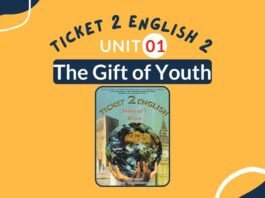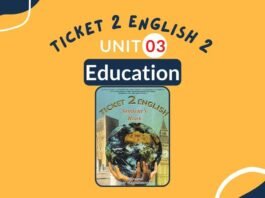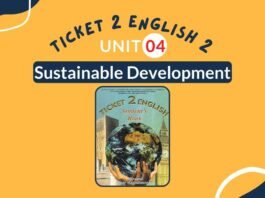This post will give you a concise overview of the key points covered in “Ticket 2 English Unit 2 Humor.” The summary includes an analysis of the vocabulary, functions, grammar, and writing elements featured in the unit. By reading this post, you will better understand the material and be better equipped to have good marks in your national exam.
Table of Content
Vocabulary Ticket 2 English Unit 2 Humour
- Humor: Something said to cause laughter
- A Joke: A short story that causes laughter
- Humorous: Amusing, funny, and laughable
- An impression: An amusing imitation of a famous person
- To make fun of someone: Laugh at someone in a mocking way
- To kid: To make jokes or to joke with someone
- Silly: Funny in a stupid way
- Witty: Funny in an intelligent way
- Comical: Causing laughter in a silly or amusing way
- Satire: A literary work that uses humor to criticize human behavior or society
- Irony: A situation that is the opposite of what was expected and often humorous
- Parody: A humorous imitation of a work of literature, music, or art
- Wisecrack: A clever and humorous remark or comment
Positive emotions or feelings: Joy – gaiety – delight – cheerfulness – merriment – vivacity – calm – satisfaction–
enthusiasm – optimism – jubilation.
Negative emotions or feelings: Anger – despair – depression – loneliness – sadness – frustration – worry – fear
Idioms: positive feeling/mood:
- Lift one’s spirit
- Things are looking up
- Walk on air
- Someone’s spirit rises
- On cloud nine
- Basking in the glory
- On cloud nine
- Walking on sunshine
- Over the moon
- Happy as a clam
- Feeling like a million bucks
Idioms: negative feeling/mood:
- To feel quite down
- Someone’s heart sinks into the depths of despair
- To be low
- Down in the dumps
- Feeling blue
- In a funk
- Sinking feeling
- Out of sorts
Functions: Expressing a lack of understanding and asking for clarification
Show a lack of understanding
- I beg your pardon.
- I beg your pardon. I don’t quite understand.
- I don’t know what you mean.
- I’m not quite sure I follow you.
- I don’t quite see what you mean.
- I’m not sure I got your point.
- Sorry, I didn’t quite hear what you said.
- Sorry, I didn’t get your point.
- I don’t quite see what you’re getting at.
Ask for clarification
- What do you mean by…?
- Do you mean…?
- Could you say that again, please?
- Could you repeat it, please?
- Could you clarify that, please?
- Would you elaborate on that, please?
- Could you be more explicit?
- Could you explain what you mean by…?
- Could you give us an example?
- I wonder if you could say that in a different way.
- Could you put it differently, please?
- Could you be more specific, please?
Functions: Making a request
A request is asking someone politely either for something or to do something.
Making request
- Can /could you + infinitive…
- Would you mind + gerund…
- Could I possibly…?
- I’d be grateful if you could…
- Can I request…?
- Have you got time to…?
- I have a request ……….
- I wonder if you can/could …
- Do you mind if …
- I need some help with…
- Please do me a favor. Will you? ………
- lend me a hand with…
- If…, that would be a great help.
Accepting
- Yes, Feel free
- Of course, with pleasure
- Yes, sure.
- Sure.
- Yes, of course.
- Certainly yes.
- With pleasure.
- Sure, don’t worry.
- Sure, no problem.
Declining/Refusing
- I am awfully sorry
- No, You/I can’t
- Oh, sorry, I can’t.
- I just can’t; I am sorry.
- I am afraid that I can’t.
- Certainly not.
Examples:
– Speaker 1: Could you please help me with this exercise?
Speaker 2: Yes, of course.
– Speaker 3: Do you mind going with me to the market?
Speaker 4: No, I don’t mind (accepting request)
-Speaker 5: Would you mind giving your brother a lift downtown?
Speaker 6: Yes. (refusing request).
– Speaker 7: I wonder if you could possibly repair this engine?
Speaker 8: Sure, don’t worry
Grammar: Modal Verbs
Click on this link to see this lesson on MODAL VERBS.
Writing: A Funny Story
Writing a funny story can be a challenging task, but it can also be a lot of fun. To create an engaging and humorous story, there are certain elements that you should include. Here are some of the critical elements that can make a funny story stand out:
Date: Setting the story at a specific time can add to its humor. The context can provide an excellent setting for a funny story, whether it’s an old or recent event.
Place: The story’s location can also play a significant role in its humor. Choosing a unique or unexpected setting can add to the story’s comedic value.
People involved: The characters in the story should be relatable and engaging. Whether friends, family members, or strangers, they should have distinct personalities that add to the story’s humor.
Main events: The events in the story should be exciting and engaging. They should also be relevant to the humor of the story. The events should be well-crafted to keep the reader entertained, whether it’s a series of accidents or a hilarious misunderstanding.
What was funny: Identifying what made the story funny is essential. This could be the characters, the setting, the events, or the dialogue. Whatever it is, it’s important to highlight what made the story humorous so that your readers can appreciate it.
You can create a funny story that will entertain and engage your readers by including these elements. Remember to keep the tone light and playful; don’t be afraid to take risks and try new things. With a bit of creativity and a lot of humor, you can write a story that will have your readers laughing out loud.
An Example of a funny story:
One day, a kid was taking a hard writing test. When the test ended, the teacher told everyone to stop writing and give their papers. But this boy kept on writing even when the teacher warned him to stop or he’ll be in trouble. He didn’t listen, finished writing a bit later, and went to give his paper to the teacher. The teacher said he won’t take it. The boy asked, “Do you know who I am?” The teacher said, “No and it doesn’t matter.” The boy asked again, “Are you sure you don’t know who I am?” The teacher said no again. So, the boy went to the pile of test papers, put his in the middle, mixed them all up, said “Good,” and left.





Thank you very much my teacher for your behavior
thank u sooo much sir
Mkamaaal katjawb 3la kolchi hahaha thx so much
Thank you
Welcome
THANK U SO MUCH TEACHER FOR THIS GREAT JOB U REALLY HALP TO START A NEW UNIT WITH A SPEACIAL AND GREAT IDEAS.THANK U
My pleasure
Thank you so much teacher for the great effort 🙂
You are welcome Miss Rajae
you are always saving us Thank you so much
That was the purpose 🙂
thnks u teacher but what about writing
I’ll put it today or tomorrow incha Allah
What about writing teacher ? Thanks alot for your help Mr Nabil
Check the writing section and you will have all what you need
I couldn’t find writing about funny icident , is it there teacher ? Sorry for taking from your time . You are a great teacher , thanks alot .
The stuff I have concerning writing is here ya Aissam
Writing
By the way, you are not disturbing me at all. 🙂
PLZ SI NABIL WHAT ABOUT WRITING IN UNIT 2 ANY HELP ABOUT IT THANK YOU
Did u check the writing section in the website?
thank you so much JAZAKA ALLAH KHAYERAN
Thnx a lot dear teacher a teacher from mohammedia
thank you bb
With pleasure 🙂
thanks a bunch
With pleasure 🙂
Thank you a lot Mr Nabil
tanks teacher
It’s a pleasure 🙂
Great job
Thanks 🙂
Thanks a lot for the great effort.
With pleasure 🙂
thank you for the great work.
it’s a duty Mr. Dnia 🙂
Give us the Listening lessons(audio) of Ticket 2 English, please. Thanks a lot
Sorry. I had them once but I don’t know where they are now.
you can provide your own listening materials.
Ssi Mohammed
I have the tracks. Where do you teach ?
Abdelali
Thanks Ssi Abdelali. why don’t you upload them or send them to me then I can put them here in the server with direct links